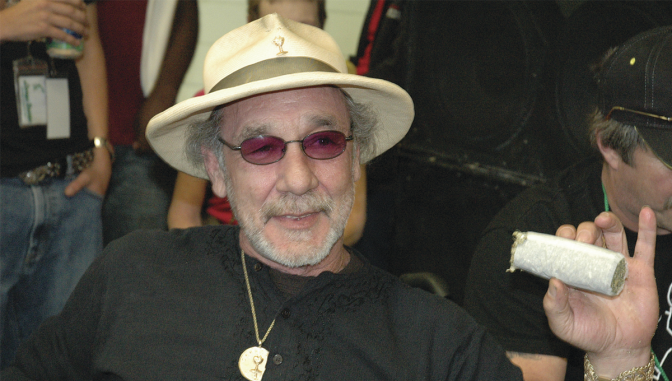Freedom Leaf Interview: Eddy Lepp

On the morning of August 18 2004, DEA agents raided Eddy’s Medicinal Gardens and Multi-Denominational Chapel of Cannabis and Rastafari in Upper Lake, Calif. They arrested Charles Eddy Lepp, who had been allowing patients to cultivate cannabis for medical purposes on his property; the 24,784 plants confiscated on his 20 acres were clearly visible from State High-way 20. In 1997, he was raided, arrested, charged and acquitted by local and state authorities for doing the same thing. But then the Feds stepped in: Lepp was convicted of federal drug felonies in 2007, and sentenced in 2009 to a 10-year mandatory- minimum prison bid.
Born on May 14, 1952 in La Harpe, Ill., Lepp was raised in Reno, Nev. and served in the U.S. Army’s military intelligence unit in Vietnam from 1969–1972, where he discovered cannabis. Lepp’s epiphany on the medical use of marijuana came in 1987, when his father used it to battle cancer, and then rose in prominence as a marijuana activist in the early 1990s. He and his late wife, Linda Senti, gathered signatures for California’s Proposition 215, and soon after its passage in 1996, Lepp formed the Medicinal Gardens that earned him his first arrest. During his time in prison, Senti passed away, and eight states, including California, legalized the adult use of cannabis. On Dec. 9, Lepp was released from prison into a halfway house in San Francisco, where he began the probationary portion of his sentence. Freedom Leaf spoke with Lepp by phone in January.
What exactly were you convicted of and sentenced for in your case?
Originally, I was looking at four life sentences, plus 40 years and $17 million in
fines on six or seven different charges. The judge threw all of the search warrants out of court, completely and totally. What I was actually convicted of was conspiracy to manufacture a controlled substance, which is growing marijuana, and conspiracy to distribute a controlled substance, which was the marijuana. I received no fine and a 10-year sentence. It’ll be eight years and two months that I’ve been in the custody of the Bureau of Prisons, by the time I get out of the halfway house. It’s been a long ride.
Where were you imprisoned?
I originally was taken to Lompoc [in California]. I ended up being there almost a year. I had come up to San Francisco to go back to court. That judge sent a letter saying, “Why isn’t he in a camp?” They transferred me to the camp at Lompoc, where I spent nearly two years. Then I was transferred to Latoona in El Paso, Tex., and to the federal prison in Florence, Colo., which is about 20 miles south of Pueblo. I thought that was kind of funny because by the time I got there, Colorado had legalized marijuana.
What was it like in prison?
Well, you know, you kind of put every-thing on hold when you go to prison. For example, I had to deal with quite a few deaths—my wife, Jack Herer and a lot of other people. You can’t deal with that aspect of your life, you have to kind of pretend it didn’t happen and get on with the day-to-day. Now that I’m out, I’ll cry for everybody I’ve lost. But you can’t show that kind of weakness in there.
While you were behind bars, there was a remarkable change in the legal status of marijuana commerce in a number of states. How does that make you feel?
I hope to go back to doing what I’ve been doing for 20 years mostly, which is being an advocate for the full legalization of hemp as an industrial product. Jack Herer and I seldom talked about the uses of cannabis—what we talked about mostly was industrial hemp and why it wasn’t being used for the purposes that God intended it. Today, the most-used commodity in products is sea kelp. It’s used in 1,200 to 1,500 products, everything from shoe polish to toothpaste. It’s been estimated that if they had the same freedom to experiment with hemp like they do with sea kelp, that hemp would be in 5,000 to 10,000 products within two years, and in over 25,000 within five. Hemp is truly God’s gift to His children, not just for spiritual use and medicinal use, but as an industrial product, second to none.
There have been big changes in that area, too, with Colorado, Oregon, Kentucky and other states beginning to legally grow hemp. That must warm your heart a bit.
I was told time and time again, when I was in prison, by various prison employees, that my problem was that I was 15 or 20 years ahead of my time. So, it wasn’t really a surprise to me, because I did see it coming many, many years ago.
As you look at this developing industry, are you worried about profit motive—about this Green Rush that’s happening?
Just as I foresaw what was going to happen 20 years ago, I can foresee what’s going to happen now. It’s big business. The big players are trying to get involved, all the time. The Scotts fertilizer company is getting involved—this is a billion-dollar company. And there’s no way to get around it; America is based on capitalism, and it always has been. So I’m not at all surprised that there are people who want to make money off of marijuana. Personally, I don’t have any trouble with that.
Should marijuana be taxed?
It should not be taxed at any higher rate than any other agricultural product. Now, I know that all of the politicians in the world see this as the golden goose laying the golden egg. But they’re completely and totally wrong about this. This plant is a gift to His children from Jah. It is not meant to be exploited by man or government. And the fact that they’re exploiting it is ridiculous. I think back to when California first legalized medical marijuana through Prop 215. There was this big hue and cry about everybody having to get state-issued registration cards so they would be registered marijuana users. I told numerous public officials: “You want to register a recommended or prescribed product like marijuana, fine, we’ll do it. But first, make a registration card for every body thats on pain pills, and a registration card for everybody that’s on anti-psychotics, and a registration card for everybody that’s using all these other drugs. Then I’ll be glad to get one for marijuana.”
Is the marijuana juggernaut too big, at this point, to stop economically?
I see no reason in the world why Donald Trump would want to stop it. Trump doesn’t hang out with congressmen and senators; he buys and sells them. I’m just talking historically, the way his world runs. Who does he hang out with? The other guys on the Fortune 500 list. That’s who he eats lunch with, who he plays golf with, who he goes into business with. There are all kinds of major national and international corporations getting into the marijuana industry. Why would Trump piss on his friends? That’s what he’s going to have to do to be totally anti-marijuana. Personally, I don’t see it happening. I think that Trump may, in fact, be a very good thing for the marijuana industry. Where Obama didn’t have the courage to follow up on his campaign promises, and do what he said he would do, Trump may very well, in fact, do it, because marijuana is a cash crop.
State governments are concerned about consumers growing their own cannabis and undercutting tax revenue. Wouldn’t it be in Trump’s friends’ best interest to kill home growing?
Are you aware of the fact that every American has the legal right to produce, without permits or interference from the government, 500 gallons of wine and 500 gallons of beer each year? Despite Budweiser and Coors, and all of these other billion-dollar alcohol companies, every-body has the right to make their own beer and wine. These giant corporations make billions of dollars selling the same product. I’m not saying that there aren’t people trying to kill it. But, I will reiterate: Marijuana should be treated the same as any other agricultural product.
How can readers get in touch with you?
I’m on Facebook. My girlfriend, Heidi Grossman, is on Facebook. Heidi will see to it that I get any and all messages. I’m looking forward to going home to Heidi. With any luck, there may be wedding bells in the future shortly.
If you enjoyed this Freedom Leaf article, subscribe to the magazine today!

